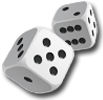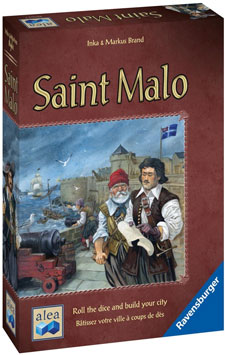



play board games
Board game reviews, strategy tips & session reports
Saint Malo Board Game Review
 Stats:
Stats:
No. of players: 2-5
Amount of time to play: 60 min
Age requirements: 9+
Set-up time: minimal
Saint Malo is a dice-rolling, city building game. You add buildings and people to your city for VPs and defense. The player with the most VPs wins, but look out for those pirate attacks.
Saint Malo Description:
Saint Malo takes place on a seven space by seven space player board that represents your city. The player board can be written on with the dry erase pens that came with the game. As the game goes on you’ll be drawing on you player board and adding to your city. The game ends once a player has filled their city.
On your turn you roll the five dice then may keep some (or none) and re-roll them. You do this one more time and then keep the results. There are six symbols a log, crate, wall, cross, head or pirates. After your third roll you must score one symbol on the dice. You may spend two coins to change any non-pirate symbol to the symbol of your choice.
Logs cost two coins to deliver and are used by the architect. Crates are added adjacent to one another in your city and are used by the merchant. The cross lets you build a church. You may build a church with the number of crosses you rolled or less and are trying to get a series. Walls must go on the outside of your city and help defend against pirates. Depending on the number of heads you roll you may add different people into your city which I’ll talk about below. Pirate symbols are marked on the central main board and at certain intervals they attack. If the pirates attack and your defense is lower than their strength (which increases each time they attack) you must lose a cannon. At the end of the game you lose five points for each cannon you had to cross off your player board.
The people you can add to your city are dependent on the number of dice you roll showing head symbols. The more you roll the better people you can add. Citizens are worth one point. Soldiers give you one point of defense. The priest scores a point for each church he is adjacent to. Architects let you build houses. The houses are added to your board and must be adjacent to each other and the architect. You can add one to three houses at a cost of one house per log. This will score you three, six or nine points respectively. The merchant gets you one coin for each crate adjacent to him. The juggler scores you two points for each different person he is next to. And the noble scores you seven VPs.
Once one player fills their city each player goes until everyone has had the same number of turns. Then you gain final scoring for filling your city, your church series, one VP for each log and two coins and minus five for each cannon you crossed out. The player with the most VPs wins the game.
Quick Review of Saint Malo:
Saint Malo is a fun game that is easy to teach and play. It uses the familiar Yahtzee re-roll mechanic and blends it with Eurogame city building.
The components for this game are excellent. The board are thick, the art work is not amazing but it iterates the theme and the rules are easy to read and follow.
I really like that you get to draw on your player board. I have some people complain about getting smudged with wet ink but I still really enjoy getting to draw symbols on my board. It is just fun.
I like how accessible the game is to non-gamers and gamers alike. You can play this with most anyone in minutes. So this game is great for family events or times you know you’ll be with non-gamers.
Randomness is expected in a dice-rolling game but being able to change your results using money is a good design to keep this from being a total luckfest.
The game can drag with more people and four is probably the most I’d play it with.
Saint Malo is a fun, accessible game. You should pick this up if you are looking for a dice-rolling game that is easy to learn and teach. Also if you want a fun game to play with your family or non-gamer friends check Saint Malo out.
Score and synopsis: (Click here for an explanation of these review categories.)
Strategy 3 out of 6
Luck 5 out of 6
Player Interaction 1 out of 6
Replay Value 4 out of 6
Complexity 2 out of 6
Fun 4 out of 6
Overall 4 out of 6

Leave a Reply